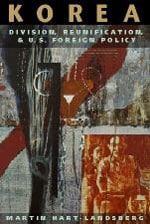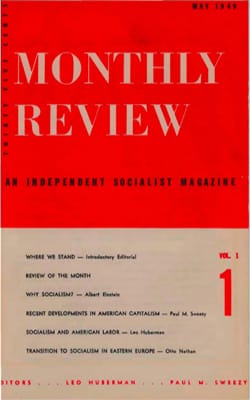Korea: Division, Reunification, and U.S. Foreign Policy
$18.00
Paperback, 266 pages
ISBN: 0-85345-927-4
Released: January 1998
This historical work, released on the eve of the fiftieth anniversary of the Korean War, overturns the conventional wisdom on Korea.
Official U.S. history portrays the Korean War as a notable example of America’s selfless commitment to democracy. According to Cold War history, South Korea emerged from the conflict to create a prosperous and dynamic economy, while U.S. troops served as the nation’s peacekeepers. This book, in a wide canvass of the historical background, contests those claims.
By careful scrutiny of U.S. policy in Asia and the history of Korean struggles for independence, Hart-Landsberg identifies the true motivations and origins of U.S. aims in Korea, showing how U.S. foreign policy opposed popular movements in the South and actually sought the division of the peninsula. That policy set in motion separate political processes in North and South Korea that resulted in a cultural tragedy for the Korean people and turned the Korean peninsula into a potentially explosive trouble spot.
Hart-Landsberg foresees opportunities for creating a different atmosphere, one capable of ending the long era of separation and hostility imposed by the Cold War.
Korean unification is one of the most important issues on the international agenda today. Hart-Landsberg’s broad-ranging inquiry develops a perspective that is rarely heard and that merits careful attention. It is a valuable contribution to a debate that should not be delayed.
—Noam Chomsky
This challenging and provocative work reveals the significant dark side of U.S. foreign policy toward Korea.
—Choice
[Korea] successsfully addresses the related realities of Korean and American foreign policy. It is especially important for its account of the early striving for unification. Carefully researched, comprehensive, and well-written, it should be able to dispel some of the lamentable ignorance that blinds Americans to all that is important and attractive on the Korean peninsula
—Science and Society
Contents
Acknowledgments
Introduction
Part I. Empire and Resistance
1. The United States and Korea
- Bridging the Pacific: Historical Origins of Empire
- The Japanese Challenge to U.S. Interests
- U.S. Hegemony and Korea
2. The Korean Struggle for Independence and Democracy
- Foreign Intervention and the Decline of the Choson Dynasty
- Korea Under Japanese Rule
- Korean Resistance
- The Rise of the Left
- Liberation
Part II. Division and War
3. From Occupation to Division
- The South Under U.S. Occupation
- The North Under Soviet Occupation
- U.S.-Soviet Negotiations and the Division of Korea
- The Road to Civil War
4. U.S. Foreign Policy and Korea, 1945-1950
- Confining Soviet Influence
- Constructing the Global Capitalist Economy
- Restructuring Germany
- Restructuring Japan
5. The Korean War
- The Beginning of the War
- Establishing Responsibility
- The Nature of the War: Phase I
- The Nature of the War: Phase II
- The Nature of the War: Phase III
- The Geneva Conference
Part III. From Division to Reunification
6. Divided Korea: The North Korean Experience
- Kim Il Sung and the Evolution of North Korean Socialism
- The North Korean Economic Miracle
- The End of the Economic Miracle
- U.S. Policy Toward North Korea
- The Distorted Nature of North Korean Socialism
7. Divided Korea: The South Korean Experience
- The Road to Military Dictatorship
- Military Dictatorship and the Economic Miracle
- Growth and Its Contradictions, 1961-1979
- The Restoration of the South Korean Growth Model
- Growth and Its Contradictions, 1980-1992
- The Resurgence of the Left
- South Korea at the Crossroads
8. The Challenge and Promise of Reunification
- The German Reunification Experience
- The Economic and Social Costs of German Absorption
- The Evolution of South Korean Reunification Policy
- Pursuing Reunification by Absorption
- South Korean Economic Policy Toward the North
- South Korean Policy Toward Japanese-North Korean Relations
- South Korean Policy Toward U.S.-North Korean Relations
- An Alternative Approach to Reunification
Notes
Index
Martin Hart-Landsberg is professor of economics at Lewis and Clark College. His writings on South Korea have appeared in numerous journals. He is the author of The Rush to Development: Economic Change and Political Struggle in South Korea (Monthly Review Press).
Publication Date: December 1998
Number of Pages: 288
Paperback ISBN: 9780853459279
Related products
-
Monthly Review Volume 2, Number 10 (February 1951) [PDF]
$10.00 Add to cart -
Monthly Review Volume 2, Number 3 (July 1950) [PDF]
$10.00 Add to cart -
Monthly Review Volume 2, Number 1 (May 1950) [PDF]
$10.00 Add to cart -
Monthly Review Volume 1, Number 10 (February 1950) [PDF]
$10.00 Add to cart -
Monthly Review Volume 1, Number 4 (August 1949) [PDF]
$10.00 Add to cart -
Monthly Review Volume 1, Number 1 (May 1949) [PDF]
$10.00 Add to cart

 [PDF].jpg)
 [PDF].jpg)
 [PDF].jpg)
 [PDF].jpg)
 [PDF].jpg)
